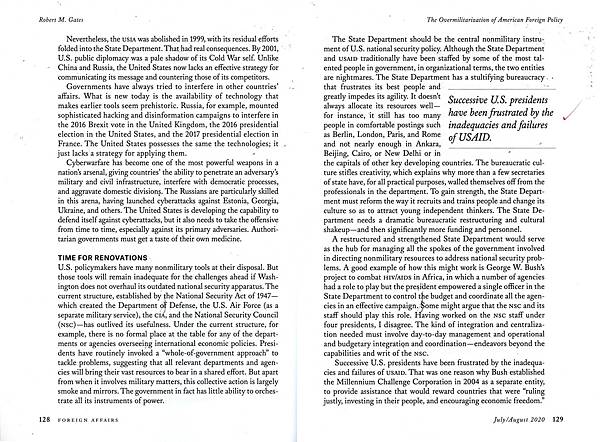Robert Gates, "Overmilitarization of American Foreign Policy"
Foreign Affairs July-August 2020 pp.121-232
accessed July 13, 2020











《外交事務》雙月刊2020年7月8月頁121—232. “美國外交政策的過度軍事化”
■「美國軍隊不應該試圖塑造其他國家的未來。不是每一件惡行、每一次侵略、每一樁壓迫、每一件危機都該引發美國的軍事反應。」
■美國2006-2011年國防部長羅波特.蓋茲(跨越小布希及歐巴馬總統內閣)如是寫道。
Donald Trump’s decision to go it alone in responding to the coronavirus pandemic is but the latest manifestation of the United States’ waning global leadership, writes Robert M Gates.
Strengthening the nonmilitary tools of U.S. foreign policy would advance U.S. national interests and create new, more cost-effective, and less risky ways to exercise American power and leadership internationally. Americans want the strongest military in the world, but they want it used sparingly and only when vital national interests are at stake. Across the political spectrum, there is a belief that post–Cold War presidents have turned too often to the military to resolve challenges abroad. The United States must always be prepared to defend its interests, but in order to revive domestic support for the United States’ global leadership role, U.S. leaders must exercise greater restraint in sending the world’s finest military into combat. It should not be the mission of the U.S. military to try to shape the future of other countries. Not every outrage, every act of aggression, every oppression, or every crisis should elicit a U.S. military response.
Finally, most Americans want their country to stand for something beyond just military strength and economic success. They want it to be seen admiringly by others as the world’s strongest advocate for liberty. In formulating a foreign policy that the American public will support, U.S. leaders should recognize that it is important to use every nonmilitary instrument of power possible to encourage both friends and rivals to embrace freedom and reform, because those objectives serve the U.S. national interest. With restructuring and more resources, Washington’s nonmilitary instruments can contribute to a remarkable symphony of power. These tools will be essential as the United States faces the prospect of a long and multifaceted competition with China. But even if U.S. officials get all the right military and nonmilitary tools in place, it will still be up to American leaders, American legislators, and the broader American public to understand that the long-term self-interest of the United States demands that it accept the burden of global leadership.
For the full article in Foreign Affairs see the following link.
ROBERT M. GATES was U.S. Secretary of Defense from 2006 to 2011. This essay is adapted from his forthcoming book Exercise of Power: American Failures, Successes, and a New Path Forward in the Post–Cold War Period (Knopf, 2020)


 留言列表
留言列表


